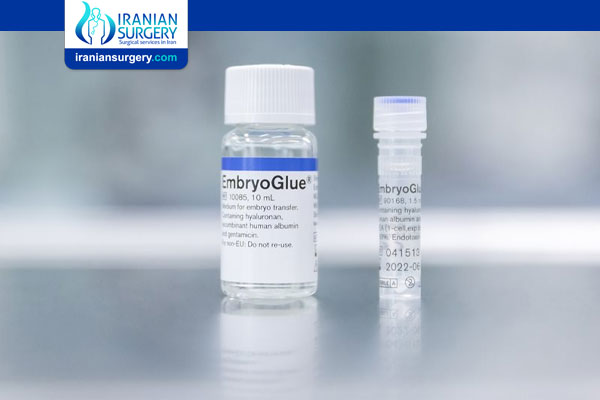Embryo Glue in IVF Guide
Thanks to recent advances in medical science, couples undergoing IVF now have a number of additional options available to increase their chances of a successful outcome. One of these options involves the use of EmbryoGlue, which is a special solution used to transfer embryos during the final stage of IVF treatment.
What is EmbryoGlue?
Despite the name, EmbryoGlue is not actually a glue, however it does contain an adhesive-like substance that helps to protect the embryo during the transfer process and create a ‘bridge’ between the tissues of the embryo and uterus. The addition of these substances has now been proven to boost the chances of a healthy embryo to implant into the uterus, in several large IVF studies.
How do the ingredients of EmbryoGlue help?
There is a natural substance found throughout our bodies called Hyaluronan that increases dramatically in the uterus at the time that embryos are due to implant. It makes good sense, therefore, that it should be present during the embryo transfer procedure.
There are several known actions of Hyaluronan that are beneficial to embryo implantation. Firstly, it is a thick (viscous) fluid that minimizes movement of the embryo inside the uterus. Secondly, it contains carbohydrate molecules that are known to be involved in the early stages of embryo implantation.
Who can benefit from using the EmbryoGlue technique?
A close analysis of the published trials that compare the success rates of the EmbryoGlue versus no EmbryoGlue has shown an overall improvement in pregnancy rates. This is especially significant in-patient groups over the age of 35, with unexplained fertility and those who have experienced a previous failed implantation. Because EmbryoGlue works by closely replicating the conditions of the mother’s uterus during implantation, we recommend the use of EmbryoGlue for most IVF patients.
Are there any risks to using Embryo Glue?
Embryo Glue is an embryo transfer medium used in the final step of IVF treatment. It has been developed to closely resemble the environment in the womb, which can help to encourage successful implantation.
There appear to be no risks to using Embryo Glue to women undergoing treatment or resultant babies. Data analysis shows that it does no damage to embryos, and gives the same chance of pregnancy as the standard medium however it may have an added benefit for patients with implantation failure.
Read more about: 5 Day Blastocyst Implantation Timeline IVF
Sources:
. https://www.repromed.co.nz/how-does-embryoglue-work/
. https://www.fertilitydost.com/articles/article-details/should-you-invest-in-embryo-glue-for-success-in-ivf-procedures-

